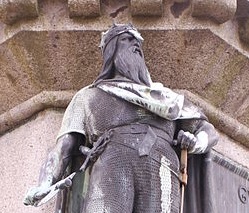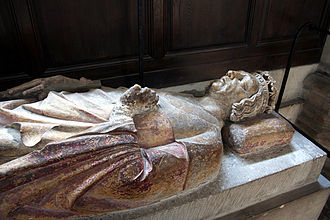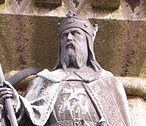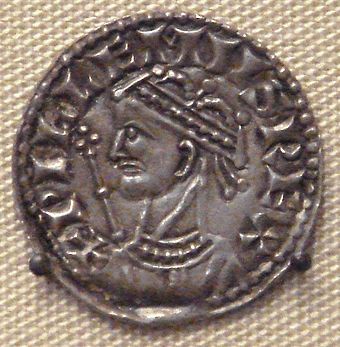| My
ancestors from Normandy |
| GENERATION
#01 |
|
Rollo

Rollo,
"Duke of Normandy",
 [1]
[1]
 was born about 860. A Viking, he became the first ruler of Normandy, in
northern France. His Scandinavian name Rolf was extended to Gaange
Rolf because he became too heavy as an adult for a horse to carry;
therefore he had to walk. He emerged as the outstanding personality
among the Norsemen who had secured a permanent foothold on Frankish soil
in the valley of the lower Seine. He led these Viking settlers from
918 until at least 928 when he was succeeded by his son William Longsword.
When he took Bayeux by force he carried off with him the beautiful Popa or
Poppa, a daughter of
Berenger, Count of Rennes and with her they had William. The
offspring of Rollo and his followers became known as the Normans.
was born about 860. A Viking, he became the first ruler of Normandy, in
northern France. His Scandinavian name Rolf was extended to Gaange
Rolf because he became too heavy as an adult for a horse to carry;
therefore he had to walk. He emerged as the outstanding personality
among the Norsemen who had secured a permanent foothold on Frankish soil
in the valley of the lower Seine. He led these Viking settlers from
918 until at least 928 when he was succeeded by his son William Longsword.
When he took Bayeux by force he carried off with him the beautiful Popa or
Poppa, a daughter of
Berenger, Count of Rennes and with her they had William. The
offspring of Rollo and his followers became known as the Normans. |
|
GENERATION
#02 |
|
William Longsword

William Longsword, "Duke of Normandy,
 [1]
[1]
 son of
the Viking Rollo and Poppa of Bayeux was born abt. 893. He succeeded
Rollo in 927. He faced a rebellion from Normans early in his reign.
He fathered his son Richard with Sprota,
a Breton captive and concubine. William later married Luitgarde,
daughter of Count Herbert II of Vermandois. He died in December 942
following an ambush by followers of Arnulf while at a peace conference to
settle their differerances. His son Richard succeeded as Duke of
Normandy.
son of
the Viking Rollo and Poppa of Bayeux was born abt. 893. He succeeded
Rollo in 927. He faced a rebellion from Normans early in his reign.
He fathered his son Richard with Sprota,
a Breton captive and concubine. William later married Luitgarde,
daughter of Count Herbert II of Vermandois. He died in December 942
following an ambush by followers of Arnulf while at a peace conference to
settle their differerances. His son Richard succeeded as Duke of
Normandy. |
|
GENERATION
#03 |
|
Richard I, "The Fearless", of
Normandy,
 [1] [1]
 (Aug
28, 932 - Nov 996) either introduced feudalism into Normandy or greatly
expanded it. By the end of his reign, the most important Norman
landholders held their lands in feudal tenure. He used marriage to
build strong alliances. His marriage to Emma of Paris connected him
directly to the House of Capet. His second wife,
Gunnor, from a rival Viking group in the
Cotentin, formed an alliance to that group, while her sisters formed
the core group that were to provide loyal followers to him and his
successors.
(Aug
28, 932 - Nov 996) either introduced feudalism into Normandy or greatly
expanded it. By the end of his reign, the most important Norman
landholders held their lands in feudal tenure. He used marriage to
build strong alliances. His marriage to Emma of Paris connected him
directly to the House of Capet. His second wife,
Gunnor, from a rival Viking group in the
Cotentin, formed an alliance to that group, while her sisters formed
the core group that were to provide loyal followers to him and his
successors. |
|
GENERATION #04 |
|
Richard II, "The Good", "Duke of
Normandy",
 [1]
[1]
 (-Aug
28, 1026) was the eldest son and heir of Richard I and Gunnor.
Richard had deep religious interests and found he had much in common with
Robert II of France, who he helped militarily against the duchy of
Burgundy. In 1000–1001, Richard repelled an English attack on the Cotentin
Peninsula that was led by Ethelred II of England. Ethelred had given
orders that Richard be captured, bound and brought to England. But the
English had not been prepared for the rapid response of the Norman cavalry
and were defeated at the
Battle of Val-de-Saire. Richard's first wife was
Judith of Brittany,
daughter of Conan I of Brittany of which they had 6 children. His
second wife was Poppa of Envermeu of which they had 2 children, Mauger and
William.
(-Aug
28, 1026) was the eldest son and heir of Richard I and Gunnor.
Richard had deep religious interests and found he had much in common with
Robert II of France, who he helped militarily against the duchy of
Burgundy. In 1000–1001, Richard repelled an English attack on the Cotentin
Peninsula that was led by Ethelred II of England. Ethelred had given
orders that Richard be captured, bound and brought to England. But the
English had not been prepared for the rapid response of the Norman cavalry
and were defeated at the
Battle of Val-de-Saire. Richard's first wife was
Judith of Brittany,
daughter of Conan I of Brittany of which they had 6 children. His
second wife was Poppa of Envermeu of which they had 2 children, Mauger and
William. |
|
GENERATION
# 05 |
|

Robert I, "The Magnificent", "Duke
of Normandy",
 [1]
[1]
 (Jun
22, 1000 - Jul 1/3, 1035) was the Duke of Normandy from 1027 until his
death in 1035. He was the son of Richard II and brother of
Richard III, who preceded him as the Duke. Less than a year after his
father's death, Robert revolted against his brother's rule, but failed. He
would later inherit Normandy after his brother's death. He was succeeded
by his illegitimate son, William the Conqueror had by his mistress
Herleva of Falaise.
(Jun
22, 1000 - Jul 1/3, 1035) was the Duke of Normandy from 1027 until his
death in 1035. He was the son of Richard II and brother of
Richard III, who preceded him as the Duke. Less than a year after his
father's death, Robert revolted against his brother's rule, but failed. He
would later inherit Normandy after his brother's death. He was succeeded
by his illegitimate son, William the Conqueror had by his mistress
Herleva of Falaise. |
| GENERATION
# 06 |
|

William I "The Conquerer",
1st Norman King of England"
 [1]
[1]
 (c1038
- Sep 9, 1087) was the first Norman King of England, reigning from 1066
until his death in 1087. His hold was secure on Normandy by 1060,
following a long struggle to establish his throne, and he launched the
Norman conquest of England six years later. The rest of his life was
marked by struggles to consolidate his hold over England and his
continental lands and by difficulties with his eldest son, Robert
Curthose. His illegitimate status and his youth caused some
difficulties for him after he succeeded his father, as did the anarchy
which plagued the first years of his rule. During his childhood and
adolescence, members of the Norman aristocracy battled each other, both
for control of the child duke and for their own ends. In 1047, William was
able to quash a rebellion and begin to establish his authority over the
duchy, a process that was not complete until about 1060. His marriage in
the 1050s to Matilda of Flanders
provided him with a powerful ally in the neighbouring county of Flanders.
In the 1050s and early 1060s, William became a contender for the throne of
England held by the childless Edward the Confessor, his first cousin once
removed. There were other potential claimants, including the powerful
English earl Harold Godwinson whom Edward named as king on his deathbed in
January 1066. Arguing that Edward had previously promised the throne to
him and that Harold had sworn to support his claim, William built a large
fleet and invaded England in September 1066. He decisively defeated and
killed Harold at the
Battle of Hastings on 14 October 1066. After further military efforts,
William was crowned king on Christmas Day 1066 in London. He made
arrangements for the governance of England in early 1067 before returning
to Normandy. Several unsuccessful rebellions followed, but William's hold
was mostly secure on England by 1075, allowing him to spend the majority
of his reign on the continent.
(c1038
- Sep 9, 1087) was the first Norman King of England, reigning from 1066
until his death in 1087. His hold was secure on Normandy by 1060,
following a long struggle to establish his throne, and he launched the
Norman conquest of England six years later. The rest of his life was
marked by struggles to consolidate his hold over England and his
continental lands and by difficulties with his eldest son, Robert
Curthose. His illegitimate status and his youth caused some
difficulties for him after he succeeded his father, as did the anarchy
which plagued the first years of his rule. During his childhood and
adolescence, members of the Norman aristocracy battled each other, both
for control of the child duke and for their own ends. In 1047, William was
able to quash a rebellion and begin to establish his authority over the
duchy, a process that was not complete until about 1060. His marriage in
the 1050s to Matilda of Flanders
provided him with a powerful ally in the neighbouring county of Flanders.
In the 1050s and early 1060s, William became a contender for the throne of
England held by the childless Edward the Confessor, his first cousin once
removed. There were other potential claimants, including the powerful
English earl Harold Godwinson whom Edward named as king on his deathbed in
January 1066. Arguing that Edward had previously promised the throne to
him and that Harold had sworn to support his claim, William built a large
fleet and invaded England in September 1066. He decisively defeated and
killed Harold at the
Battle of Hastings on 14 October 1066. After further military efforts,
William was crowned king on Christmas Day 1066 in London. He made
arrangements for the governance of England in early 1067 before returning
to Normandy. Several unsuccessful rebellions followed, but William's hold
was mostly secure on England by 1075, allowing him to spend the majority
of his reign on the continent.
|
|
GENERATION
# 07 |
King Henry I, of England,
 [1]
[1]
 (1068 - 1135) also known as Henry Beauclerc, was
King of England from 1100 to his death in 1135. He was the fourth son
of
William the Conqueror and was educated in
Latin and
the
liberal arts. On William's death in 1087, Henry's elder brothers
Robert Curthose and
William Rufus inherited
Normandy and England, respectively, but Henry was left landless. He
purchased the County of
Cotentin in western Normandy from Robert, but his brothers deposed him
in 1091. He gradually rebuilt his power base in the Cotentin and allied
himself with William against Robert
(1068 - 1135) also known as Henry Beauclerc, was
King of England from 1100 to his death in 1135. He was the fourth son
of
William the Conqueror and was educated in
Latin and
the
liberal arts. On William's death in 1087, Henry's elder brothers
Robert Curthose and
William Rufus inherited
Normandy and England, respectively, but Henry was left landless. He
purchased the County of
Cotentin in western Normandy from Robert, but his brothers deposed him
in 1091. He gradually rebuilt his power base in the Cotentin and allied
himself with William against RobertPresent at the place where his brother William died in a hunting
accident in 1100, Henry seized the English throne, promising at his
coronation to correct many of William's less popular policies. He married
Matilda of Scotland and they had two surviving children,
William Adelin and
Empress Matilda; he also had many illegitimate children by his many
mistresses. Robert, who invaded in 1101, disputed Henry's control of
England; this military campaign ended in a negotiated settlement that
confirmed Henry as king. The peace was short-lived, and Henry invaded the
Duchy of Normandy in 1105 and 1106, finally defeating Robert at the
Battle of Tinchebray. Henry kept Robert imprisoned for the rest of his
life. Henry's control of Normandy was challenged by
Louis VI of France,
Baldwin VII of Flanders and
Fulk V of Anjou, who promoted the rival claims of Robert's son,
William Clito, and supported a major rebellion in the Duchy between
1116 and 1119. Following Henry's victory at the
Battle of Brémule, a favourable peace settlement was agreed with Louis
in 1120.
Considered by contemporaries to be a harsh but effective ruler, Henry
skilfully manipulated the barons in England and Normandy. In England, he
drew on the existing
Anglo-Saxon system of justice, local government and taxation, but also
strengthened it with additional institutions, including the royal
exchequer and itinerant
justices. Normandy was also governed through a growing system of
justices and an exchequer. Many of the officials who ran Henry's system
were "new men" of obscure backgrounds rather than from families of high
status, who rose through the ranks as administrators. Henry encouraged
ecclesiastical reform, but became embroiled in a serious dispute in
1101 with Archbishop
Anselm of Canterbury, which was resolved through a compromise solution
in 1105. He supported the
Cluniac order and played a major role in the selection of the senior
clergy in England and Normandy.
Henry had 24 illegitimate sons and daughters with various mistresses.
His legitimate children by Matilda include:
1. Matilda of England

 (Feb 7, 1102 - Sep 10, 1167)
(Feb 7, 1102 - Sep 10, 1167)
Married Geoffrey V Plantagenet. See the
Plantagenet family for
continuation of this line. |



